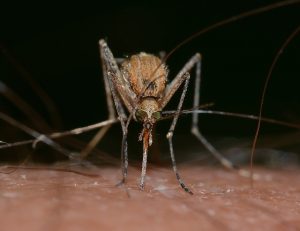By NewsDesk @bactiman63
In a follow-up on the record West Nile virus (WNV) outbreak in Arizona this year, state health officials now report 763 total cases (275 confirmed and 488 probable) through Oct. 27. This is up from 55 total cases two weeks ago and by far the most in the United States.

704 of the cases, or 92 percent were reported in Maricopa County, the home of the city of Phoenix. The county also accounts for 95 percent of the WNV deaths reported year to date (54 of the 57 fatalities).
Maricopa County has a case fatality of more than 7 percent.
In 2020, Maricopa County saw three WNV cases and one death.
It takes 2-6 days for a person to develop symptoms after being bitten by a mosquito infected with WNV.
Only 1 out of 5 people with WNV will have symptoms. Individuals may develop a fever with other symptoms, such as headache, body aches, joint pains, vomiting, diarrhea, or rash. Most people who experience these symptoms will recover completely, although fatigue and weakness can last for weeks or months.
Subscribe to Outbreak News TV on YouTube
Severe illness can occur in people at any age; however, people over 60 years of age are at the greatest risk for severe illness. Additionally, individuals with certain medical conditions, such as cancer, diabetes, hypertension, kidney disease, and people who have received organ transplants are also at greater risk for serious illness. In more severe cases, the illness can affect the brain causing encephalitis (swelling of the brain) or meningitis (swelling of the surrounding brain tissues). The symptoms of neurologic illness can include headache, high fever, neck stiffness, disorientation, coma, tremors, seizures, or paralysis. Recovery from severe illness may take several weeks or months and some of the neurologic problems may be permanent. Rarely, death can occur.
- Florida: COVID-19 cases have decreased 90% since August
- San Diego reports 2 additional Shigella cases in current outbreak among homeless
- South Africa: Eastern Cape and KwaZulu-Natal are hot spots for the circulation of rabies
- Costa Rica reports decrease in COVID-19 cases, deaths last week
- ‘With advances in vaccination, we have seen a 90% drop in cases and deaths in seven months’: Brazil Health Minister
- Cryptococcus gattii outbreak in porpoises and dolphins in the Salish Sea
- H5N6 avian influenza case reported in Guangdong Province: Chinese officials


This is a grim and tragic reminder of why my One Health research group maintains a high level of mosquito surveillance activity around the globe. WNV is a mosquito-borne disease, but it is also a zoonotic disease, involving other mammals and birds as infectious reservoirs. We must understand and prudently manage the entire environment as it relates to mosquitoes, livestock, pet animals, and wildlife, if we are to control diseases like WNV and many others. Also, like SARS-CoV-2 that causes COVID-19, the West Nile Virus WNV did not originate in the Americas. Wise disease management must always consider that a pathogen causing a disease in one part of the world is a potential threat to other regions. Thus, our public health work must be global health work, always maintaining geographical awareness and international collaboration.